
A FIRST AMENDMENT PUBLICATION
Woodland Hills, California Volume 141 - Issue 8 Wednesday, October 30, 2024 Free Copy


A FIRST AMENDMENT PUBLICATION
Woodland Hills, California Volume 141 - Issue 8 Wednesday, October 30, 2024 Free Copy


a
By Delilah Brumer Editor-in-Chief
The 2024 election is less than a week away, but there’s still time to learn more about the local, state and national races that have a direct impact on the Pierce College community. From state infrastructure bonds to local community college board races, the ballot for this election can be a lot to take in. That’s why the Roundup worked to break down some relevant information to help the Pierce community get educated before voting.
Beyond understanding what’s on the ballot, it’s also important to consider a
range of perspectives on campus. Student voters are projected to play a major role in this election. The Roundup worked to highlight students’ diverse perspectives on political issues.The Roundup worked to amplify student voices throughout this election-focused issue.
Nearly 41 million members of Generation Z will be eligible to vote in the November 2024 election, according to the Center for Information Research on Civic Learning and Engagment at Tufts University.
Student voters’ opinions, pg. 3 Politics and the classroom, pg. 4
Youth voting patterns, pg. 4
Ballot propositions explained, pg. 5 Where to vote near campus, pg. 6 LACCD board elections, pgs. 7-8 And more

6201 Winnetka Ave.
Woodland Hills, CA 91371
Room: Pierce College Village 8211
Phone: (818) 710-4115
Phone: (818) 710-4117
Website: www.theroundupnews.com
Email: newsroom.roundupnews@gmail.com

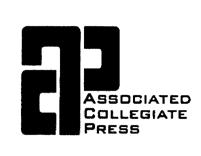

Editor-in-Chief..............Delilah Brumer
Managing Editor..............Violet Garcia
Photo Editor...................Karla Delgado
News Editor....................Brian Khoury
Campus Life Editor....Gerardo Escobar
Opinion Editor................Daisy Malone
Sports Editor............Abraham Elizalde
Copy Editor............Raquel G. Frohlich
Copy Editor.........Christian Castellanos
Reporters
Nathalie Herrera
Alfonso Vargas
Ryan Kassebaum
Matthew Stewart
Daisy Aguinada
Oscar Silva
Jonathan Wheelock
Erica Logan
Tim Lewis
Photographers
Moses Murga
Angelina Guerrero
Kenneth Chan
Karla Villacorta
Marzia Rankin
Melanie Jurado
Joseph Marquez
Hanna Vandergugten
Victor Montiel
Advisers
Jill Connelly
Jeff Favre
Tracie Savage
*For advertising, call: (818) 710-2960
Corrections?
Email us at newsroom.roundupnews@ gmail.com
Historically, turnout among young voters has been low, especially when compared to older voters. Younger people sometimes complain and feel disillusioned with the state of their government, and according to a 2020 FiveThirtyEight and Ipsos poll, Americans aged 18 to 34 were less likely to have faith in the political system.
But young people are capable of considerable changes in politics if they voted more.
Gen Z alone was projected to account for more than 40 million of potential voters in 2024, according to Circle. This is such a significant number that even a fraction of the demographic could sway a close election.
While there are several factors as to why voter turnout among young people is low, it is important that Pierce College students recognize why they should be civically engaged and understand the impact that voting has.
According to Circle, the youth vote helped President Joe Biden’s performance in key states such as Georgia and Arizona in 2020.
Where young voters struggle to turnout in particular are local elections. Youth civic
engagement is important, because local elections directly impact the area they live or the public school they attend.
Having more young voters can introduce new outlooks on issues or new ways of dealing with existing issues and ensure that young people’s voices are heard and adequately represented.
Voting can affect issues that may be important to many students such as rent control, funding for public works and who represents their congressional district.
There are multiple items on this year’s ballot that directly impact Pierce students. There are three elections for Board of Trustees seats. In addition, Proposition 2 is on the ballot, which would allow the state of California to sell a $10 billion bond to fund public schools and community colleges, $1.5 billion of which would go into community colleges, according to the Legislative Analyst’s Office.
For some voters, the problem may be that all the measures on the ballot can be confusing. Students could take advantage of online voter guides to educate themselves, such as the CalMatters voter guide at
https://calmatters.org/californiavoter-guide-2024/.
For some students who don’t vote, the issue could be accessing a voting center, but Pierce students can also take advantage of the on-campus polling place that will be set up from Nov. 2 to Nov. 5 in Building 600, according to the Communications Office.
While youth voter turnout has been low for decades, and it may be that voting is a habit that is developed over time, according to the New York Times, it is important for people to vote as soon as they are eligible, especially considering how much power they can have and what rights and protections may be threatened.
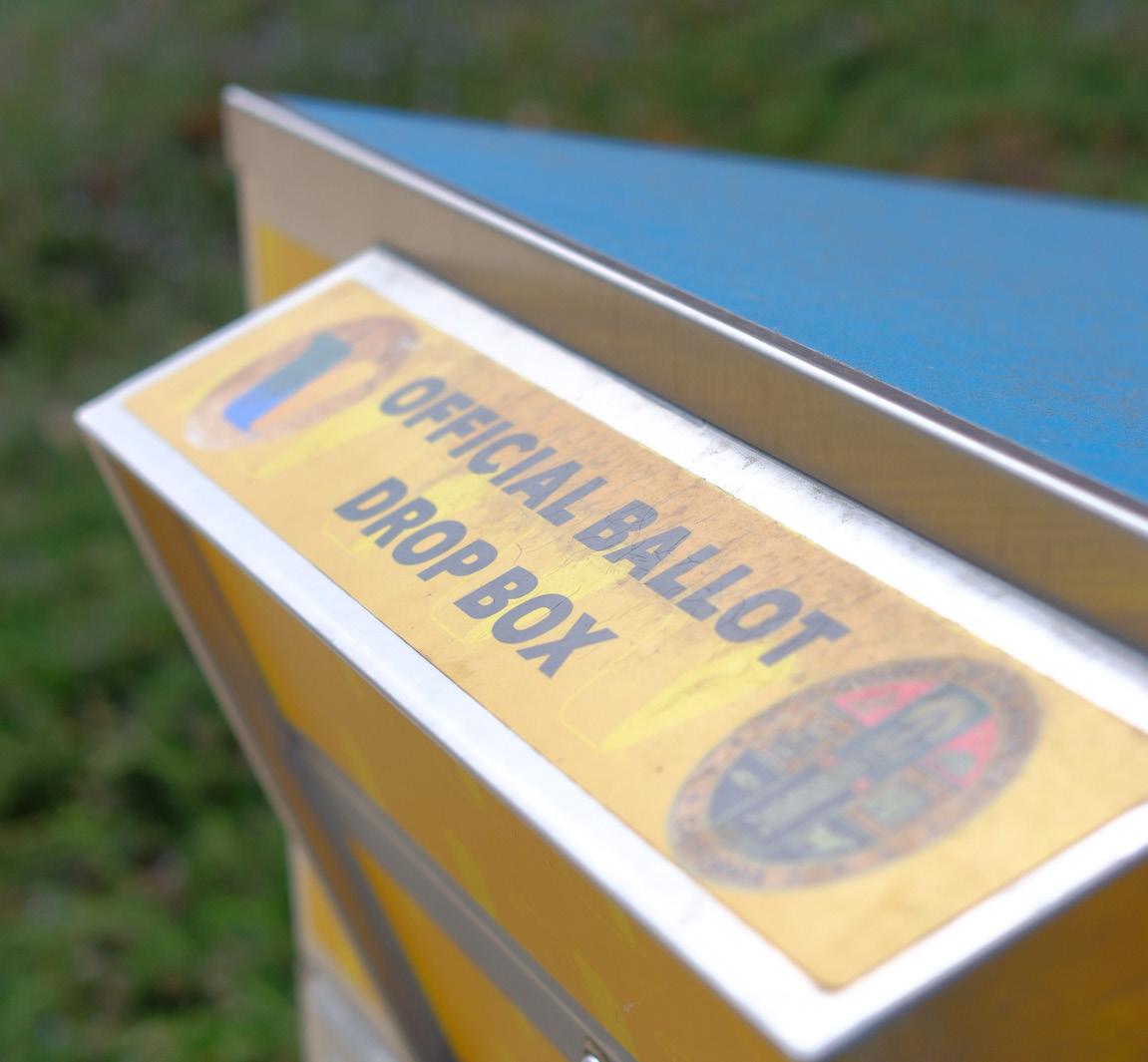
On Wednesday, Oct. 26, 1988, The Roundup published Volume 69, Number 5.
A debate on abortion held on campus devolved into divisive politics in the Campus Center. Republican Jim Rendleman and Democrat Mark Lit, candidates for the 29th and 28th State Assembly District tickets respectively, discussed their views on abortion in front of Pierce College attendees.
Rendleman believed that sex education should be available for students to avoid unwanted teenage pregnancies from occurring.

Lit believed that the government should play a more active role in parental planning, supporting teens who do want to have children. He hoped that, with enough support, teens would be persuaded to keep their pregnancies instead of terminating them.
Throughout the event, students shouted phrases including “Why aren’t we paying for abortions when we are paying for Star Wars?” and “Why are
we paying for Contras?”
Star Wars was a concept proposed by president Ronald Reagan, where nuclear bombs could be shot by missiles before they reached American soil.
The Contras were a right-wing paramilitary group partially funded by the CIA to help destroy Nicaragua’s Communist government.
Rendleman tried to defuse the audience’s tensions, and carried on with the debate.
No one in the audience raised their hands when asked if there was anyone planning to vote in the election solely for abortion related issues.
Many students complained that the candidates were too focused on the upcoming election, resulting in the debate being less about abortion rights and more about party motivations.
Copy by Daisy Malone.

By Daisy Aguinada Reporter
Voting for the first time can be an empowering next step toward adulthood for many Generation Z voters. This experience offers an opportunity to impact future generations, as Gen Z becomes a more significant voting group.
As Gen Z voters join their peers in casting their ballots for the upcoming election, their decisions on crucial issues, from gun violence to reproductive rights, can influence the outcome. I believe that this experience creates a sense of responsibility and hope, even for first-time voters, emphasizing how each vote adds to a bigger movement.
According to the Pew Research Center, Gen Z is the most progressive generation in terms of social issues.
I’ve participated in this election as a first-time voter. It’s crucial for me to educate myself
with proper information on the policies and stances I’m voting for. Being a first-time voter this election, it feels important and overwhelming, especially for those who are a part of Gen Z. There is a lot of pressure when making an informed decision in today’s divided political climate. With information being presented to us, both reliable and not, navigating it all can be challenging for those who have never voted before.
“Young people are ready yet again to make their voices heard.” Harvard Institute of Politics Director Setti Warren told to The Harvard Crimson.
As a first time voter, I have felt both excited and anxious about this election. Social media plays a huge role in this, often amplifying my anxiety with its constant stream of information and opinions. However, it also helps me stay informed and engaged with the issues that matter most to me.
Social media has played a crucial role in helping Gen Z first time voters stay informed, aware of critical issues, and updates on the current election. According to a study by the UCLA Center for Scholars & Storytellers, more than half of Gen Z primarily stays updated on news through social media platforms.
“Today’s young people are chronically online,” the study says, suggesting that our media consumption is influencing our political views and increasing the likelihood of young people voting.
I have found navigating the complexities of the election process challenging, but it has been empowering to know that when I placed my ballot to vote, I’m contributing to the future. Generation Z’s drive to vote for the 2024 election demonstrates the generation’s desire to shape the future by focusing on crucial topics such as climate change and the economic state of

America. First-time voters join a movement ready to make a difference.
Half of all eligible Gen Z voters participated in the 2020 election, marking a significant increase compared to previous generations, according to the Center for Information and Research on Civic Learning and Engagement (CIRCLE).
According to Harvard’s Youth Poll of Fall 2024, John Della Volpe, polling director at the Institute of Politics, “Gen Z and young millennials’ heightened enthusiasm signals a potentially decisive role for the youth vote in 2024.”
It’s important to recognize the impact Gen Z may have on this year’s election. Voters from Gen Z are not only more involved than in previous years, but we have been more outspoken about topics that will influence our nation in the future.
By Karla Delgado Photo Editor
The Deferred Action for Childhood Arrivals (DACA) program is a gift and a curse. It has brought opportunities to many undocumented children who were brought into the U.S. illegally, without their knowledge of how difficult it would be to be in a different country. Many arrived at an unknown land with their parents in hopes of bringing their children a better life, but with it came hopes and hardships.
Many undocumented children were given the chance to apply for a work permit that authorized them to work in the U.S. legally with the hopes of not being deported temporarily. Although it wasn’t a path to legal status it gave us hope of being able to contribute to their futures and earn an income to help their families.
This program was an answer they had been looking forward to for years after fighting to be given a pathway to citizenship.
DACA has impacted their lives in the best possible way, roughly
832,881 young adults were able to work legally, attend school, and help plan their lives without being afraid of stepping out into the street and being deported. It allowed them to get better jobs with greater benefits and better working conditions, including a raise that helped improve their way of life for their families.
DACA recipients also became a big part of the U.S. economy, helping to increase tax sales which many paid about $5.6 billion in federal taxes and $3.1 billion in state and local taxes each year.
Many DACA recipients made use of this opportunity by attending school, and in 2019, 83% were working towards earning a bachelor’s degree or higher. This program was made to help undocumented children find a piece of comfort during uncertain times.
However, these recipients have been met with difficulties after a judge in Texas ruled DACA to be unlawful. In 2021, Judge Andrew Hanen declared the program had violated the Administrative Procedure Act. This ruling blocked new applicants from
continuing and starting their DACA applications, causing them to go into limbo.
An estimated 93,000 were stuck part-way through the process when the judge decided to rule against the program, while 400,000 eligible people are now left out of the program. This ruling became another stepping stone for some conservatives who have been against DACA since the very beginning.
Many undocumented residents were considering applying to college, working or getting a driver’s license, since some other states don’t allow immigrants to take advantage of these opportunities that U.S. citizens get.
The immigration crisis going on at the border has made it more difficult for children of immigrants to get a straight answer to a solution that has been at stake for years.
Former Vice President Kamala Harris has emphasized doing what she can to help protect DACA recipients, but it is not enough reassurance that there will be a permanent solution.
Time after time, immigrants
are kept in the dark. DACA applicants were given little hope to move forward with their lives.
The more this situation drags on, it feels as if it is being used as a pawn to gain voters on either side of the political parties.
Paper that determines a person’s status should not be what also determines their value to others. No one should ever feel afraid about living in a country that preaches about giving people an opportunity for a better life. Something permanent needs to happen.
People should value each other for their hard work and ethics, instead of their legal status. This election season, as immigration is a key talking point, it’s important to remember the human side of the issue.
Are you voting in this election? Why or why not?

“I’m not voting. I’m just not really into politics, and I don’t know too much about either party, and what they plan to do. I don’t have too much interest in it.”
Yax Kin - Psychology
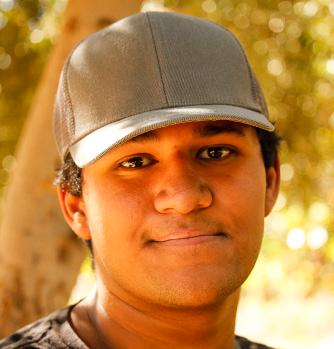
“I’ve never really gotten around to it. It just never really struck to me, but recently I’ve been rethinking about it, and most likely I might reinstate myself into my right to voting very soon.”
Josiah Lugo - Video
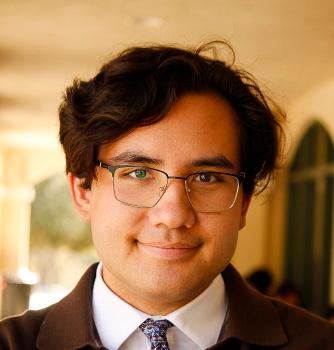
“I’m planning on voting. I’m still not registered, but thankfully due to California laws, I can still be registered. I want to vote on the propositions that will be overall beneficial to, not only the state, but to me.”
Cameron Junod - Political science

“I haven’t planned on voting yet. I’m still doing my research to see which side to pick. Every vote counts in the nation, no matter if you just turned 18 or you’ve been doing it for your whole life.” Alessandro Aviles - Kinesiology
By Alfonso Vargas Reporter
With election day looming, some Pierce College professors and students talk politics in class — while others say it’s best to keep political discussions out of the classroom.
Political science professor Denise Robb said she is open to discussions about political opinions in class, but she emphasized that she doesn’t try to persuade students of her views. Instead, she said it’s important to be tolerant of a range of perspectives.
“You can just be neutral, or you can give your political position and make sure they feel open,” Robb said. “The most important thing is that they feel open to share their position without being offensive to people.”
Robb brings in local political party representatives to speak to her classes, for students to gain diverse perspectives.
“That’s why I have the Democratic, Republican, Libertarian and Green Party come and speak to my students, so they can hear from all different points of views,” Robb said.
Kamelia Tashakor, said it’s important to be open to political discussions on campus.
“It’s really important, because a lot of politics are intertwined with our everyday lives, and it’s interesting to hear all different perspectives that could end up
opening up someone else’s mind into something that they might not have considered in the past,” Tashakor said.
Economics major Mobowofoluwa Fasheun believes that discussing politics in classrooms depends on the subject of the class and whether it can be incorporated without causing division.
Fasehun said he believes politics in the classroom is a good thing, as long as professors know how to incorporate it in their teaching plan.
“If the teacher isn’t really experienced in talking politics, that could leave some pretty bad taste in the mouth of students,” Fasheun said.
Math professor Mitchell Pumar rarely brings up politics in class, except if the topic of the class discussion is inherently political.
“If I’m teaching about, like today, I was teaching about supply and demand. There’s a little bit of politics that we can discuss there,” Pumar said.
Pumar said it’s important to see if there is the right atmosphere in the classroom to handle political discourse.
“I think people, as soon as politics comes up, get very emotionally charged and invested in their point of view, and you might run the risk of offending,” Pumar said. “You know your students, and you don’t really want to be offensive towards your students.”
Pumar added that no one knows somebody’s political views by looking at them, and he wants students’ opinions valued and welcomed into the classroom.
Robb said she believes the benefits of being open about
politics in a classroom are for students to understand how to be engaged in the political system.
“We have a democracy,” Robb said. “And if you’re not engaged in a democracy, it dies.
Democracy literally means rule by the people. And if the people are uneducated, apathetic, disinterested, democracy will die.”

By Jonathan Wheelock Reporter
As election season enters the final stretch, presidential candidates are courting the youth vote, which could have a major impact on the outcome of the race.
The youth vote is characterized as the voting demographic of ages 18 to 24, however some sources characterize it as ages under 30. In the 2024 election, this age range will make up 44% of eligible voters, giving them huge sway, according to Rock the Vote.
Pierce College computer science major Dylan Pirlant thinks that it’s important to vote.
“You’re helping decide who’s going to run your country,” Pirlant said. “You’re pretty much deciding your future.”
Both Vice President Kamala Harris and Former President Donald Trump have targeted the
youth vote in the closing weeks of election season. According to USA Today, Trump has put his focus on undecided young males, while Harris has put her efforts into high-profile celebrity endorsements such as Taylor Swift and Billie Eilish to increase young female support.
The gender gap between young men and young women has increased recently, “driven by Harris’s 30-point lead among women,” according to the Harvard Kennedy School Institute of Politics.
According to the Harvard Youth Poll, Vice President Kamala Harris was shown to be leading Former President Donald Trump by 28 points among likely voters under 30.
“The political gap between young men and young women has emerged as a key feature of this election,” said Chair of the Harvard Public Opinion Project Anil Cacodcar in a statement. “The Harris and
Trump campaigns have deployed extensive resources to reach both groups. Overall, young voters break strongly for Harris in this poll.”
Celebrity endorsements and targeted advertisements aren’t the only reasons young people
This year’s National Voter Registration Day, Sept. 26, held the highest number of registrations in one day on Vote. org, with more than 35,000 new registrations. According to Vote. org, this year’s National Voter Registration Day’s numbers
“I’m planning on voting because it’s my first time voting, and I think it’d be pretty cool to vote in a historic election.”
Roman Bantug Pierce student
vote. According to the Harvard Institute of Politics, “When young Americans believe their friends will vote, 79% plan to vote themselves — compared to just 35% among those who think peers won’t participate.”
showed an almost 23% increase in voter registration when compared to last year’s. The site states that it, “saw a 72% increase in 18 year olds registering compared to National Voter Registration Day 2019, and a 115% increase in 18
year olds registering compared to 2022.”
Roman Bantug, a Pierce student and a first-time voter, says he plans on voting.
“I’m planning on voting because it’s my first time voting and I think it’d be pretty cool to vote in a historic election,” Bantug said.
The youth vote has been steadily increasing throughout the past election years. According to an article by Circle Tufts, roughly 50% of youth, ages 1829, voted in the 2020 presidential election. This was an 11 point difference from 2016, which only had 39% of youth voters.
Electrical Engineering major Jorge Romero wants to vote because he feels his opinion does matter.
“It should matter,” Romero said.“And I want my choice to matter in the future of the country.”

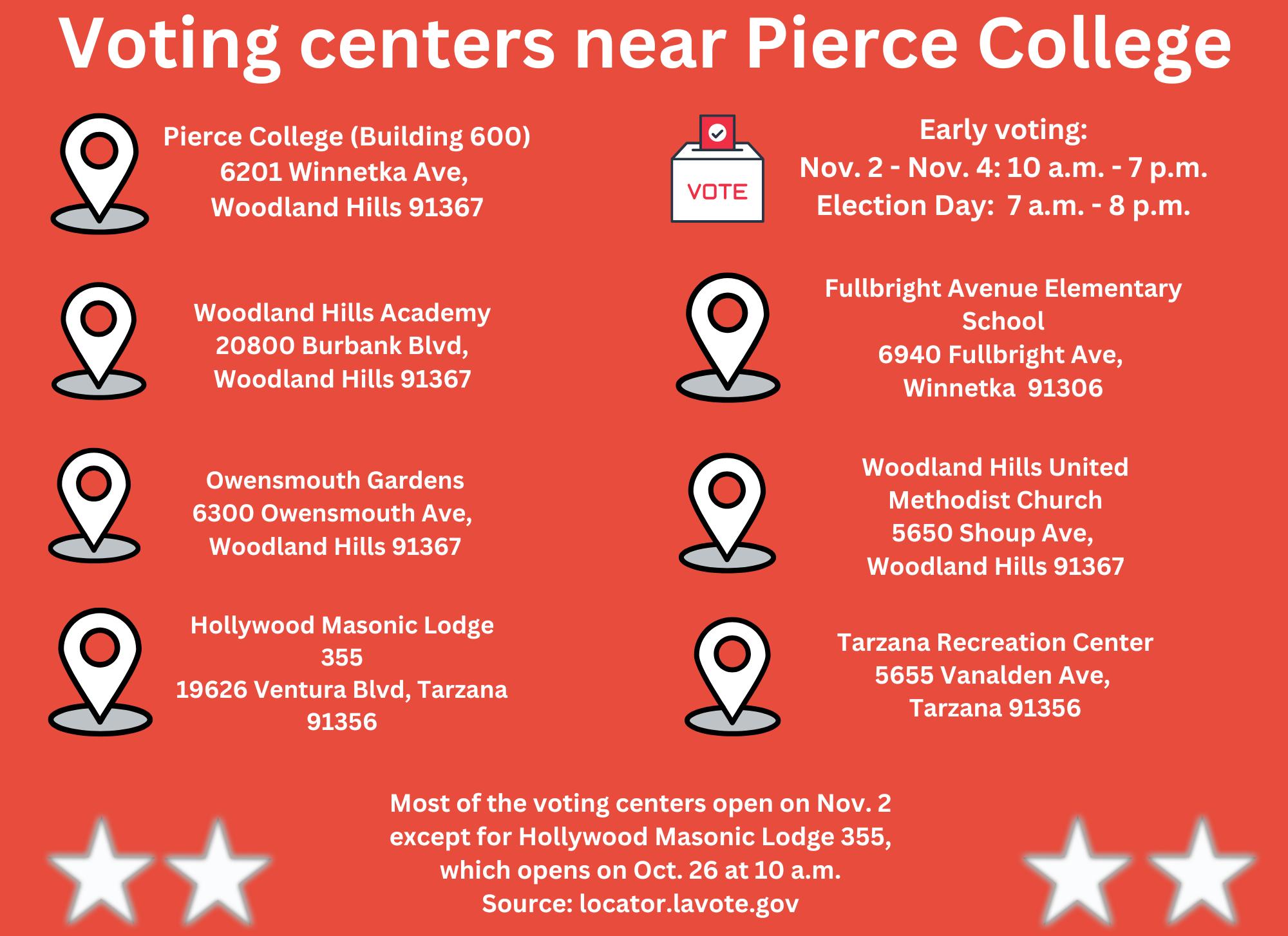

By Ryan Kassebaum, Matthew Stewart and Violet Garcia
Twelve candidates are competing for four open seats on the Los Angeles Community College District (LACCD) Board Of Trustees. The community college district in Los Angeles is one of the largest in the United States, and because the positions are at-large, all voters in the district will select a candidate for each seat.
The candidates are former and current faculty members, incumbent trustees and activists who, if selected, will serve fouryear terms. Each member has chosen the specific seat they are running for and are not limited to their geographic area.
A total of 12 individuals are running for board seats one, three, five and seven. The Roundup reached out to each candidate with a request for comment.
Each candidate was asked the following questions:
1. “What experience would you bring to the LACCD Board of Trustees and how would you use it to inform your decisionmaking?”
2. “How would you go about ensuring financial sustainability for the district?”
3. “What are your main priorities when it comes to supporting student success?”
1. “Number one, I’m a business person since 9/11. That’s my vocation, I’m in the business of business. I had an online business in ‘94. I graduated in two years with a four year degree under $5,000. First, it was Subway, then the Navy then [I] worked front of house. I’ve accomplished a lot in such a short period of time. Many don’t believe me until they see the pictures. I worked in biodiesel and in between that I opened a dispensary. I didn’t like what that stood for. After diesel I went back to the Navy and then I went back to merger acquisitions. Then I got into politics and also opened up nonprofit organizations. After that I got into politics and my political career began. I don’t want people to have the question if he can get it done. Because I have done it all.”
2. “We’ll have to audit. Not put money aside for all the sexual harassment. What programs are working. But accountability. Just use what programs are working the minimum medium and on this program it’s without compromising. These guys they’re not in business, they’re in a world of a busy mess. And you
start trimming that way and so I start identifying programs that are not as effective or effective as it was projected to be and what we resolve that, then we move down, we got the ball rolling.”
3. “Because I’m the guy who graduated in two years for a four year degree, I understand the fact that’s in the process, right? And people just say blanketed by saying, what you gonna do how you can do it? I say attack them at the high school level. For the guy who’s just walked out of prison, he wants to get his rag teas because Chris Collins is known for it because I own a detox center. They’re used to going there to get their drug counseling AA degree, right?
He’s not looking to be Mr. MIT. He’s not looking to be.
He’s not looking to be Mr. motorcycles. He’s not looking for that. He’s looking for a vocation where he can get paid ,in where he can excel in and and and as further his skills set and his portfolio.
That’s what he’s looking for. And I want to identify that student at the high school level. Or do you want to get a skill and jump into a trade? So your learning curve is lower, you got a hands- on- skill, and you walk into a job where you’re making six figures. right?
That’s the better use of that guy’s time. that young lion’s time. That’s a better use of his time.”
Andra Hoffman Incumbent. Director of career services and job placement at Glendale Community College
1. “I am the longest consecutive serving board member on the LACCD Board, being first elected in 2015. In 2020 I was re-elected with the most votes of any candidate in the history of the district (886,000). For the past 27 years I have been an Educator and Director of Student Services Programs at Glendale Community College running the Transfer Center, Career Center and Job placement services including internships, oncampus and off campus student employment. I am also a Board Member with the Community College League of California and am the immediate Past President of the Statewide Trustee Board for Community College League of California where I have direct access and input to community college policy discussions.”
2. “I serve as Chair of the LACCD Board’s Budget and Finance Committee and under my leadership, we have healthy reserves and through various programs including state and federal grants, real-estate and facilities leases and our district foundation, we have been able to generate revenue. We are
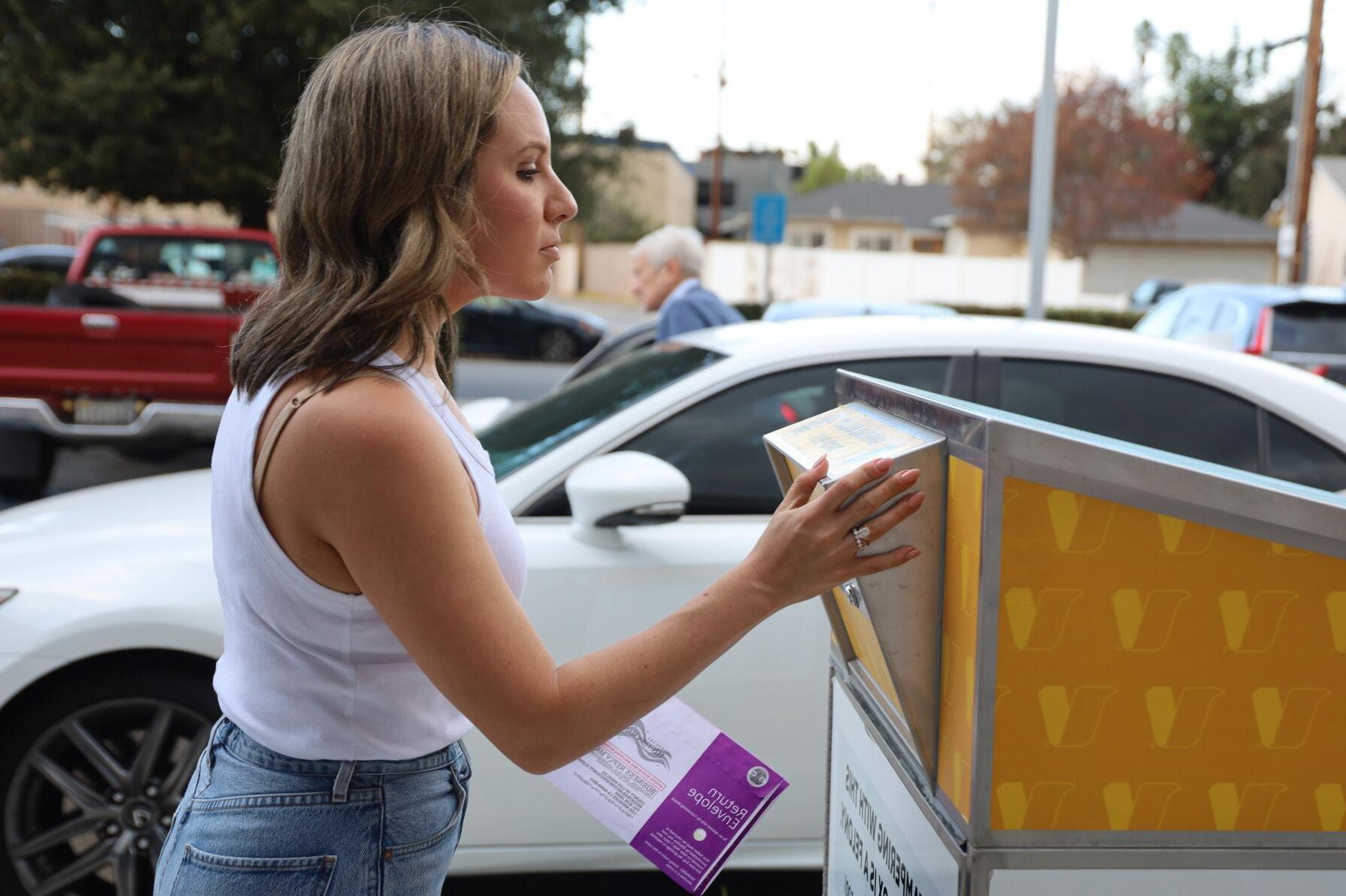
currently looking at our operating budget projections for the next five years to ensure that we are fiscally stable and continue to have the resources to provide excellent programs and services and to support students.”
3. “LACCD serves the most diverse students in the state of California including some of the most economically disadvantaged, former foster youth, justice involved and formerly incarcerated students, unhoused students, low income working adults, students with disabilities, undocumented students, recent immigrants with language barriers, student parents and there has been an uptick in students with mental health challenges. I have ensured that we have made investments in dedicated resources to help students by providing access to affordable housing, food and mental health services in an effort to reduce barriers, close equity gaps and focus on student success. When re-elected, I will continue to focus on supporting student basic needs.”
Peter MangheraTeacher
1. “I will bring a lot of experience to the board. I was a teacher for LA Unified for 40 years and for many of those years they taught seniors who went onto the local junior colleges in the area where I live that would be Harbor Community College. I have worked with students in the struggle to try to find the best college to meet their needs and I think I can help them by strengthening the community college system and help them with their transfers either to your
college or to learn a trade.”
2. “Ensuring financial stability would be one of the most important things of a member of the trustee board can do. The most important thing was to study the budget and see where we can send more resources to assist students and away from bureaucracy tax raises would be difficult during this time in the economy so we’d have to work on the budget to see where we can find places to help students and get rid of things that we really don’t need. “
3. “My main dream and helping with students’ success is not only to help in their academic area, but also to help students who want to learn the trade. Not much is mentioned about students who want to go on to practical success with the trades such as welding, plumbing, air condition repairment. I think junior college is as a jumping point for both academic and practical trades. I had a cousin who became an air condition repairman and made close to 80 to 100,000 a year, as a result of that training.”
Cheyenne Sims HBCU Route Executive Director
1. “I am deeply motivated to pursue this position due to my personal journey through the community college system, where I faced many of the challenges that students encounter. Serving on the board would provide me the opportunity to directly address these issues and enhance the student experience as they work toward their degrees. My first hand understanding of these challenges uniquely positions me to advocate for effective solutions
that can create a meaningful impact in our community.
2. “I believe financial stability starts with addressing the corruption within the district that is taking away millions of dollars from student success. For instance, a $125 million security contract was awarded to the LA Sheriffs due to the unethical actions of an administrator who had previously been dismissed by a prior district and later terminated by LACCD for sexual assault. This contract could have easily gone toward funding student employment programs throughout the district.
3. To address food insecurity, LACCD should establish wellstocked food banks or pantries on every campus, providing healthy food at no cost throughout the year. Implementing weekly Farmers’ Markets on all nine campuses that accept SNAP/ EBT will offer fresh food options to our students.
Additionally, we need emergency response funds to support students and part-time employees facing financial difficulties. I propose allocating $1.8 million, with $200,000 per campus, to create fast fund/direct aid and need-based mini-grant programs for students and parttime staff.
To enhance support further, we should increase student employment opportunities around campuses. By partnering with local businesses and organizations, we can create flexible job options that allow students to earn income while balancing their academic responsibilities. This initiative will not only provide financial relief but also help students gain valuable work experience.
Furthermore, I advocate for tripling funding for gateway housing programs to ensure that no LACCD student faces homelessness. These actions will meet the needs of our students and support their academic success.”
Nancy Pearlman Environmentalist, anthropologist and former college educator Pearlman did not reply to a request for comment.
Louis Anthony Shapiro Retired educator Shapiro did not reply to a request for comment.
David Vela Consulting firm owner Vela did not reply to a request for comment.
Nichelle Henderson Incumbent Henderson did not reply to a request for comment.
Elaine Alaniz Medical healthcare recruiter
1. “Elaine Alaniz was born in Weslaco, Texas. She earned an associate degree in Film Production from Los Angeles
City College in 2018 and an associate degree in Fire Science Technology from Los Angeles Valley College in 2020. Her career experience includes working as a recruiter in healthcare. She has served on the City of Los Angeles Department of Neighborhood Empowerment, Westlake North Neighborhood Council as Treasurer (2019-2020) and President (2020-present).
Alaniz has been an affiliated member with SAG/AFTRA, delegate for the GOP Presidential Delegation (2024), the CAGOP Platform Committee (2024), the Los Angeles County Republican Central Committee Chair (2022-Present), EmpowerLAL.A. REPAIR Participatory Budgeting Board of Advisors (2023), Los Angeles City Neighborhood Council Budget Advocate: Region 6, and has served on the Los Angeles City Mayor’s Crisis Response Team, as a Crisis Responder (2015-Present). All of the platforms that she has served on have helped Elaine understand the unique financial, physical and emotional needs of several communities throughout Los Angeles. This will allow her to make well informed decisions on the needs of each college campus throughout the district.
2. “The most important thing is to manage and maintain a healthy budget and to be conservative with spending. This
begins with conducting internal audits to objectively analyze what has already been spent and what are projected costs on current projects. Developing and maintaining job placement partnerships with organizations to help usher graduates into the workforce after graduation, will help to be competitive in the education market. With mindful review, surveys, evaluations and effort in diversifying the current circula, to offer programs, certificates and degrees that are highly sought out in the market, will strengthen highdemand programs throughout all campuses and will help increase enrollment ensuring financial sustainability.”
3. “Affordable education for students by providing electronic textbooks for all courses at no cost to the student. This would not replace the purchase of hard copy textbooks, but rather give the student options and an opportunity to save on the high cost of textbooks. Restore future expectations of workforce success by investing in careerready training and vocational programs throughout all nine campuses. Food and nutrition plays an important role for students’ success. Although there are programs on campus that help some students with food the quality must be raised up to higher standards, therefore establishing other food options for students is on the top of my list, along with

helping “all” students with food vouchers, including international students which have often been neglected with food voucher opportunities.”
Jason Aula Business owner/journalist/ lawyer
1. “Experience California community college graduate; former LACCD faculty union organizer, AFT 1521; currently a lawyer & member of ownership of Affirm Holdings, Inc., Amazon, Apple Inc., eBay, Green Dot corporation, Just Eat Takeaway.com, Lyft Inc., Manchester United Plc, Microsoft Corporation, PayPal, Petco Health, and Wellness Company, The New York Times, Sprouts Farmers Market, & Uber; apprentice to prominent civil rights attorney, Matthew S. Pappas.”
2. “By unwelcoming illegal immigrants and condemning their presence millions of FAFSA dollars will free up for US citizens and humans with legal permission such as a visa since the suspected terrorists launder their FAFSA south-of-theborder typically. The LACCD has become a place where most “dreamers” launder to nations south-of-the-border and other areas of the world from time to time, or fraudulently spend financial aid money “biting that hand that feeds” them (USA).”
3. “Priorities: Reestablish Pierce College Farm compulsively in accordance with the presently breached district master plan for national security & to honor the Pierce brothers. Partner with the US Air Force, US Army, US Marines, & US Navy to recruit students to join the armed forces for real time employment in lieu of transfer or graduation. Condemn evil Chinese communist terrorism in Los Angeles including consumption of canine & feline meat and cannibalism via district mandate. I intend to wipe out suspected terrorist students’ access to our FAFSA funds by partnering with FBI & ICE to make it a safe place for citizen students and students with legal permission to attend and access programs to advance their educational goals.”
Kelsey Iino Incumbent. President of the El Camino College Federation of Teachers
1. “I have spent my entire professional career dedicated to
the community college system. Three years as a part time faculty member, and the last 14 full time tenured. I work with students on a daily basis and am aware of their issues, challenges, dreams, goals, responsibilities, needs, and aspirations. As a practitioner in the field, I have participated in accreditation, Planning and Budget, Curriculum, Academic Senate, College Council, and COVID Task Force. These experiences make me a critical contributor to the decision making at the community college board level.
In addition to being a counseling faculty member at the community college, I also serve as the Foundation (scholarship) faculty board member, and I am President of my faculty union, representing nearly 1000 faculty. I am also a product of the community college system. In the last two years on this board I have seamlessly transitioned into the position. I am currently the VP of the board, Chair of the Legislative and Public Affairs Committee, Chair of the APIDA Advisory Committee to the Chancellor, voting member of the Facilities Master Planning Committee, Athletics Ad Hoc Committee, Black/African American Ad Hoc, Gender Equity Ad Hoc, and Basic Needs Ad Hoc. I have represented and advocated for the LACCD District and community college system at Federal, State, and Local legislative meetings, commencement, national and local community events, campus events, and on forums.”
2. “Main issues to support students and the District.”
3. “Mitigating roadblocks for students to achieve their personal and professional goals at the community college and beyond. Affordable/free education, addressing housing insecurities for students, addressing food insecurities for students, enrollment and retention, the Student Centered Funding Formula (SCFF), the great resignation, and providing dignity, manageable working conditions, and purpose to those who work for the District and for the students attending the District.”
Robert Payne Writer, researcher, and instructor
Payne did not respond to a request for comment.